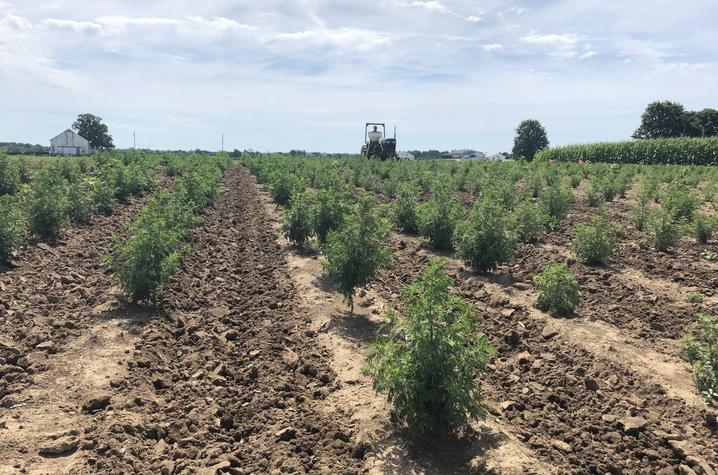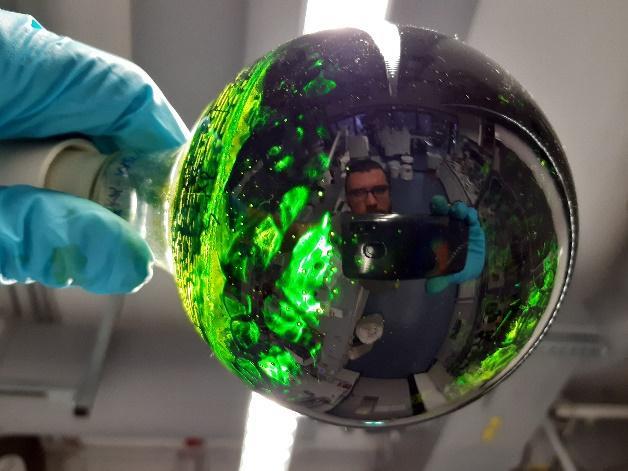- Campus News
- Student News
- UK HealthCare
- UK Happenings
- Arts & Culture
- Professional News

Artemisia Annua Could Be Promising Treatment for COVID-19

LEXINGTON, Ky. (June 25, 2020) – Recent lab studies by chemists at the Max Planck Institute of Colloids and Interfaces (Potsdam, Germany) in close collaboration with virologists at Freie Universität Berlin have shown that extract from the medicinal plant Artemisia annua , also known as Sweet Wormwood, is active against SARS-CoV-2, the virus that has caused the COVID-19 pandemic.
The new potential treatment has been added to the University of Kentucky’s innovative clinical trial for experimental COVID-19 therapies, which was launched by leaders from UK’s Markey Cancer Center, College of Medicine and College of Pharmacy in May.
The new arms of the clinical trial will test the effectiveness of Artemisia annua extract as well as artesunate, a derivative of the plant that is a standard treatment for malaria in many parts of the world.
The new trial arm is supported by ArtemiLife, which recently collaborated with UK on a clinical study using Artemisia annua grown in Kentucky to test for the anti-cancer activity of its extract and to determine the recommended dose of Artemisia annua for future clinical trials.
“The University of Kentucky and UK Markey Cancer Center are delighted to continue our collaboration with ArtemiLife to study this Kentucky-grown Artemisia annua as a potential treatment for patients with COVID infections,” said Jill Kolesar PharmD, co-leader of the Drug Development Program at Markey Cancer Center and professor in the University of Kentucky College of Pharmacy.
The ongoing trial has a “pick-the-winner” design, which will allow UK researchers to rapidly understand what potential therapies appear to be effective, guiding patients to treatments that work and researchers to promising drugs that warrant further investigation.
“While there is no standard treatment for COVID-19, this trial gives us the ability to test multiple therapies rapidly in order to identify the most promising agents,” said Dr. Susanne Arnold, a medical oncologist and associate director of clinical translation at the UK Markey Cancer Center who is co-leading the trial. “This rapid assessment means that the trial can quickly include and test new therapies such as Artemisia annua .”
Each treatment is selected by a multidisciplinary committee of medical experts from across the university as some of the most unique and promising compounds that can be studied at the moment. The drugs are also attractive candidates for repurposing for treatment of COVID-19 considering they have excellent safety profiles and are readily available, rapidly scalable, and relatively inexpensive.
UK’s clinical trial is reserved for high-risk patients both at home and in the hospital who have tested positive for COVID-19, or who have COVID-19 symptoms but have not developed severe symptoms that would require intensive care unit treatment. Patients with COVID-19 who choose to enroll in the trial will be randomly assigned to one of four treatment groups including Artemisia annua .
UK’s COVID-19 related research is coordinated by the COVID-19 Unified Research Experts (CURE) Alliance team, which is uniting UK medical researchers across disciplines in the fight against the novel coronavirus. The Alliance was launched and is supported by UK College of Medicine Dean Robert DiPaola and Vice President for Research Lisa Cassis.
The team plans to scale up a larger, more traditional placebo-control clinical trial using the most promising therapy from the pick-the-winner trial.
Latest Stories
2024 oswald research and creativity competition winners announced, easy and delicious recipes for every home cook, advancing kentucky: uk alum laura farnsworth strengthens her community by bringing people together, cats for ghana poised to help overseas students excel, piano concert to delight with sounds and sights.
Freie Universität Berlin
Service navigation.
- Legal Notice
- Data Protection Policy
- Emergencies
- Accessibility Statement
- DE: Deutsch
- EN: English
- Prospective Students
- Students and Doctorate
- Researchers
- Alumni and Supporters
- Journalists
- Continuing Education
- Office of Communication and Marketing
Path Navigation
- Press Releases
- International Press Releases
Extracts of the plant A. annua are active against SARS-CoV-2
Cooperation between scientists from the max planck institute, university of kentucky and freie universität berlin.
№ 107/2020 from Jun 24, 2020
Chemists at the Max Planck Institute of Colloids and Interfaces (Potsdam, Germany) in close collaboration with virologists at Freie Universität Berlin have shown in laboratory studies that aqueous and ethanolic extracts of specially bred sweet wormwood plants ( A. annua ) are active against the new coronavirus that has caused the COIVID-19 pandemic. Human clinical trials to test the efficacy of both teas and coffee containing A. annua as well as the anti-malaria drug artesunate are about to begin at the University of Kentucky’s academic medical center.
For millennia, herbal folk medicines in Asia, Africa, and South America have been used to treat infectious diseases. Extracts of A. annua plants have been successfully employed to treat febrile diseases including malaria. Artemisinin is extracted from this plant and is the basis for the WHO-recommended anti-malaria combination therapies used in millions of adults and children each year with few, if any, side effects.
The use of A. annua teas as malaria treatment is promoted as a natural combination therapy against infections, although the WHO strongly discourages their use amid concerns about the development of malaria drug resistance. We set out to determine whether A. annua extracts – pure artemisinin and related derivatives, and mixtures thereof – may be active against the COVID-19 virus. These drugs would be attractive candidates for repurposing considering they have excellent safety profiles and are ready availability, rapidly scalable, and are relatively inexpensive.
“Having worked with compounds derived from A. annua plants, I was familiar with the interesting activities of the plants against many different diseases, including a range of viruses. Therefore, we felt that exploring the activity of this plant against COVID-19 was worth the undertaking” says Prof. Peter H. Seeberger who initiated and oversaw the study together with Dr. Kerry Gilmore.
Plant Extracts Inhibit Viral Plaque Formation
A. annua leaves, from a cultivated seed line grown by ArtemiLife Inc.in Kentucky, USA, when extracted with absolute ethanol or distilled water provided the best antiviral activity. The addition of either ethanolic or aqueous A. annua extracts prior to virus addition resulted in significantly reduced plaque formation. The ethanolic extract of both A. annua and coffee was found to be most active. However, artemisinin alone does not present much antiviral activity. “I was surprised to find that A. annua extracts worked significantly better than pure artemisinin derivatives and that the addition of coffee further enhanced the activity” says Klaus Osterrieder, Professor of Virology at Freie Universität Berlin who conducted all activity assays.
Human Clinical Trials Using Teas and Coffees About to Begin in Kentucky
To test the activity of A. annua extracts, COVID-19 human clinical trials with teas and coffees containing A. annua leaves provided by ArtemmiLife Inc. are about to begin at the University of Kentucky’s academic medical center. In addition, artesunate, an artemisinin derivative used to treat malaria will be used in a Phase 1/2 clinical trial as well.
“The University of Kentucky and UK Markey Cancer Center are delighted to continue our collaboration with ArtemiLife to study this Kentucky-grown A. annua as a potential treatment for patients with COVID infections,” said Jill Kolesar PharmD, co-leader of the Drug Development Program at Markey Cancer Center and professor in the University of Kentucky College of Pharmacy.

About the Max Planck Institute of Colloids and Interfaces
The Max Planck Society has a world-leading reputation as a science and technology research organization, with 33 Nobel Prizes awarded to their scientists, and is widely regarded as one of the foremost basic research organizations in the world. It supports fundamental research in the natural, life and social sciences, the arts and humanities in its 86 Max Planck Institutes. The Max Planck Institute of Colloids and Interfaces was founded in 1992 and is divided into four departments. The Biomolecular Systems Department investigates the chemistry and biology of carbohydrates and has been working on the medical aspects of artemisinin since 2012. https://www.mpikg.mpg.de/en
About the Freie Universität Berlin
Founded in West Berlin in 1948, the Freie Universität Berlin is a research university in Berlin, Germany. It is one of Germany's most distinguished universities, and is known for its research into the humanities, and social sciences, as well as into the natural and life sciences.
About the University of Kentucky
Founded in 1865 in Lexington, Kentucky, the University of Kentucky is increasingly the first choice for students, faculty and staff to pursue their passions and their professional goals. UK is ranked among the top 10 percent of U.S. public institutions for research expenditures — a tangible symbol of its breadth and depth as a university focused on discovery that changes lives and communities. The university is also home to UK HealthCare, ranked as the No. 1 hospital in Kentucky by U.S. News & World Report, and the UK Markey Cancer Center, the only National Cancer Institute-designated cancer center in the state.
About ArtemiLife Inc.
ArtemiLife Inc. is commercializing Artemisia annua-based products. ArtemiLife Inc. blends cutting edge science with pesticide-free growing and US-based production techniques. ArtemiLife Inc. currently sells a range of teas and coffees supplemented with Artemisia annua. The company provided the leaves and extracts used for the studies reported here.
Press photo

A flask containing ethanolic A. annua plant extract. Image Credit: © Dr. K. Gilmore
The photo is available for journalists to download and is free of charge if used in the context of the press release.
Further Information
Original publication:.
Gilmore, K.; Osterrieder, K.; Seeberger, P.H. (2020): "Artemisia annua Plant Extracts are Active Against SARS-CoV-2 In Vitro"; submitted for publication.
- Prof. Dr. Peter H. Seeberger, Director Max Planck Institute of Colloids and Interfaces, phone: +49 (0) 331-567-9300, email: [email protected]
- Carsten Wette, Head of Public Relations, Freie Universität Berlin, phone: +49 30 / 838-73189, email: [email protected]
- Allison Perry, Public Relations Officer, University of Kentucky, email: [email protected] (preferred), phone: 606-782-7735

IMAGES
VIDEO